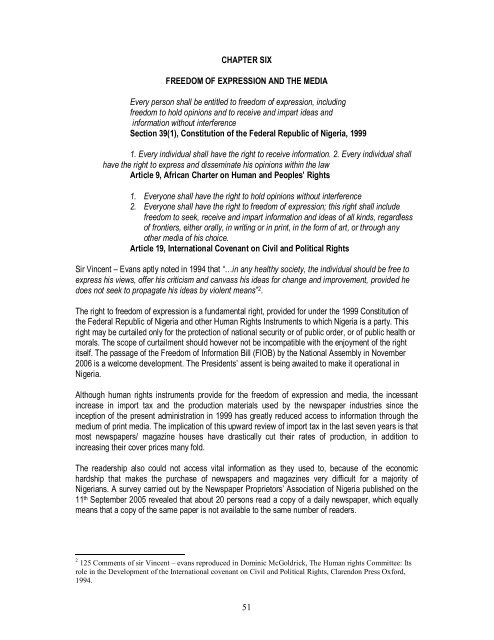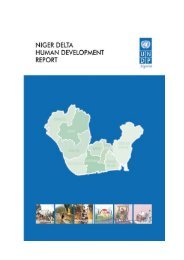THE STATE OF HUMAN RIGHTS IN NIGERIA 2005 - UNDP Nigeria ...
THE STATE OF HUMAN RIGHTS IN NIGERIA 2005 - UNDP Nigeria ...
THE STATE OF HUMAN RIGHTS IN NIGERIA 2005 - UNDP Nigeria ...
You also want an ePaper? Increase the reach of your titles
YUMPU automatically turns print PDFs into web optimized ePapers that Google loves.
CHAPTER SIXFREEDOM <strong>OF</strong> EXPRESSION AND <strong>THE</strong> MEDIAEvery person shall be entitled to freedom of expression, includingfreedom to hold opinions and to receive and impart ideas andinformation without interferenceSection 39(1), Constitution of the Federal Republic of <strong>Nigeria</strong>, 19991. Every individual shall have the right to receive information. 2. Every individual shallhave the right to express and disseminate his opinions within the lawArticle 9, African Charter on Human and Peoples’ Rights1. Everyone shall have the right to hold opinions without interference2. Everyone shall have the right to freedom of expression; this right shall includefreedom to seek, receive and impart information and ideas of all kinds, regardlessof frontiers, either orally, in writing or in print, in the form of art, or through anyother media of his choice.Article 19, International Covenant on Civil and Political RightsSir Vincent – Evans aptly noted in 1994 that “…in any healthy society, the individual should be free toexpress his views, offer his criticism and canvass his ideas for change and improvement, provided hedoes not seek to propagate his ideas by violent means” 2 .The right to freedom of expression is a fundamental right, provided for under the 1999 Constitution ofthe Federal Republic of <strong>Nigeria</strong> and other Human Rights Instruments to which <strong>Nigeria</strong> is a party. Thisright may be curtailed only for the protection of national security or of public order, or of public health ormorals. The scope of curtailment should however not be incompatible with the enjoyment of the rightitself. The passage of the Freedom of Information Bill (FIOB) by the National Assembly in November2006 is a welcome development. The Presidents’ assent is being awaited to make it operational in<strong>Nigeria</strong>.Although human rights instruments provide for the freedom of expression and media, the incessantincrease in import tax and the production materials used by the newspaper industries since theinception of the present administration in 1999 has greatly reduced access to information through themedium of print media. The implication of this upward review of import tax in the last seven years is thatmost newspapers/ magazine houses have drastically cut their rates of production, in addition toincreasing their cover prices many fold.The readership also could not access vital information as they used to, because of the economichardship that makes the purchase of newspapers and magazines very difficult for a majority of<strong>Nigeria</strong>ns. A survey carried out by the Newspaper Proprietors’ Association of <strong>Nigeria</strong> published on the11 th September <strong>2005</strong> revealed that about 20 persons read a copy of a daily newspaper, which equallymeans that a copy of the same paper is not available to the same number of readers.2125 Comments of sir Vincent – evans reproduced in Dominic McGoldrick, The Human rights Committee: Itsrole in the Development of the International covenant on Civil and Political Rights, Clarendon Press Oxford,1994.51










